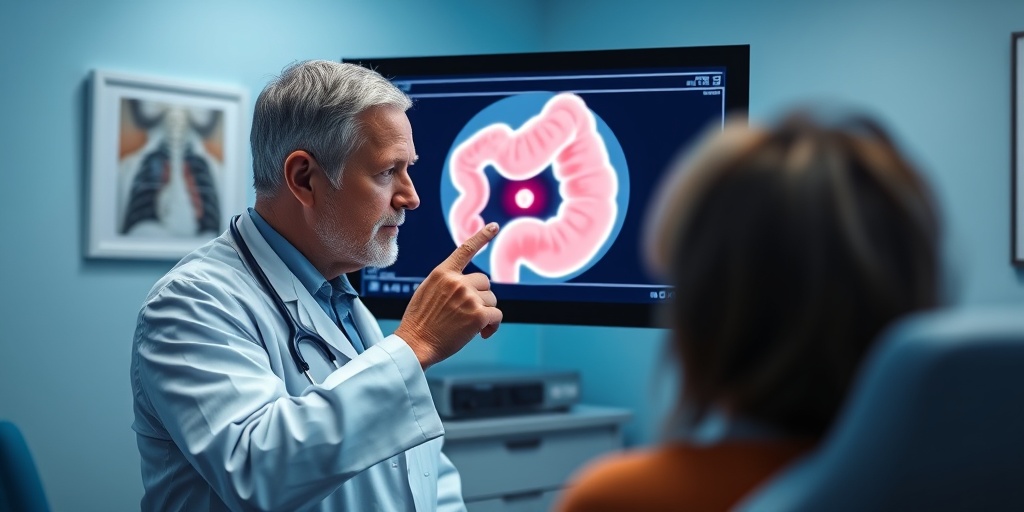What Is a Polyp?
A polyp is a growth that forms on the lining of various organs in the body, most commonly in the colon, stomach, and nasal passages. These growths can vary in size and shape, and while many polyps are benign (non-cancerous), some can develop into cancer over time. Understanding what polyps are and how they can affect your health is crucial for early detection and prevention.
Polyps are typically classified as either sessile (flat) or pedunculated (attached to the lining by a stalk). They can be discovered during routine screenings, such as colonoscopies, where doctors can remove them if necessary. Regular screenings are essential, especially for individuals over the age of 50 or those with a family history of polyps or colorectal cancer.
Symptoms of Polyps
Many people with polyps may not experience any symptoms, which is why routine screenings are so important. However, some potential symptoms can include:
- Rectal bleeding
- Changes in bowel habits, such as diarrhea or constipation
- Abdominal pain or discomfort
- Unexplained weight loss
If you experience any of these symptoms, it’s essential to consult a healthcare professional for further evaluation.
Types of Polyps
There are several types of polyps, each with distinct characteristics and implications for health. Understanding these types can help you and your healthcare provider make informed decisions about monitoring and treatment.
1. Adenomatous Polyps
Adenomatous polyps are the most common type of polyp found in the colon. They are considered precursors to colorectal cancer, meaning they have the potential to become cancerous over time. There are three subtypes of adenomatous polyps:
- Tubular adenomas: These are the most common and have a lower risk of becoming cancerous.
- Tubulovillous adenomas: These have features of both tubular and villous adenomas and carry a moderate risk of cancer.
- Villous adenomas: These are less common but have a higher risk of becoming cancerous.
2. Hyperplastic Polyps
Hyperplastic polyps are generally small and considered benign. They are usually found in the colon and are not associated with an increased risk of colorectal cancer. However, their presence may warrant further investigation, especially if they are large or if there are multiple polyps.
3. Inflammatory Polyps
Inflammatory polyps often occur in individuals with inflammatory bowel disease (IBD), such as ulcerative colitis or Crohn’s disease. These polyps are typically benign but can indicate underlying inflammation that requires management.
4. Sessile Serrated Polyps
Sessile serrated polyps are a type of polyp that can also develop into colorectal cancer. They are often flat and can be challenging to detect during routine screenings. Regular monitoring is essential for individuals with these polyps.
5. Nasal Polyps
Nasal polyps are soft, painless growths that develop on the lining of the nasal passages or sinuses. They can cause symptoms such as nasal congestion, loss of smell, and sinus infections. While they are not cancerous, they can significantly impact quality of life and may require treatment.
Conclusion
Understanding polyps and their types is vital for maintaining your health. Regular screenings and consultations with healthcare professionals can help detect polyps early, allowing for timely intervention. If you have concerns about polyps or related symptoms, consider reaching out to a healthcare provider or visiting Yesil Health AI at yesilhealth.com for evidence-based health answers.
Stay informed and proactive about your health! 🌟

Polyp Symptoms
Polyps are abnormal growths that can develop in various parts of the body, most commonly in the colon, stomach, and nasal passages. While many polyps are benign, some can lead to serious health issues, including cancer. Recognizing the symptoms of polyps is crucial for early detection and treatment. Here are some common symptoms associated with polyps:
1. Gastrointestinal Symptoms
When polyps form in the gastrointestinal tract, they can cause a range of symptoms, including:
- Abdominal Pain: Discomfort or pain in the abdomen can be a sign of polyps, especially if they are large.
- Changes in Bowel Habits: This may include diarrhea, constipation, or alternating between the two.
- Blood in Stool: The presence of blood can indicate polyps, particularly in the colon.
- Unexplained Weight Loss: Losing weight without trying can be a concerning symptom.
2. Nasal Polyps Symptoms
Nasal polyps can lead to a variety of symptoms that affect breathing and overall comfort:
- Blocked Nasal Passages: This can result in difficulty breathing through the nose.
- Loss of Smell: Many individuals with nasal polyps report a diminished sense of smell.
- Frequent Sinus Infections: Chronic sinusitis can be a result of nasal polyps.
- Facial Pain or Pressure: This can occur due to inflammation and blockage.
3. Other Symptoms
Depending on the location of the polyp, other symptoms may include:
- Vaginal Bleeding: In women, polyps in the uterus can cause abnormal bleeding.
- Urinary Issues: Polyps in the bladder may lead to frequent urination or discomfort.
It’s important to note that many polyps do not cause symptoms, which is why regular screenings, especially for colorectal polyps, are essential for early detection. If you experience any of the above symptoms, consult a healthcare professional for further evaluation. 🩺
Causes of Polyps
The exact cause of polyps can vary depending on their type and location. However, several factors are known to contribute to the development of polyps. Understanding these causes can help in prevention and early detection.
1. Genetic Factors
Some individuals may have a genetic predisposition to developing polyps. Conditions such as Familial Adenomatous Polyposis (FAP) and Hereditary Nonpolyposis Colorectal Cancer (Lynch Syndrome) significantly increase the risk of polyp formation. If you have a family history of polyps or colorectal cancer, it’s crucial to discuss screening options with your doctor.
2. Lifestyle Factors
Certain lifestyle choices can also contribute to the development of polyps:
- Diet: A diet high in red and processed meats and low in fruits and vegetables may increase the risk.
- Obesity: Being overweight is linked to a higher risk of developing polyps.
- Smoking: Tobacco use has been associated with an increased risk of various types of polyps.
- Alcohol Consumption: Excessive alcohol intake can also play a role in polyp development.
3. Age and Gender
Polyps are more common in individuals over the age of 50, and men are generally at a higher risk than women. Regular screenings, such as colonoscopies, are recommended starting at age 45 or earlier for those with risk factors.
4. Chronic Inflammation
Conditions that cause chronic inflammation in the gastrointestinal tract, such as ulcerative colitis or Crohn’s disease, can increase the likelihood of polyp formation. Managing these conditions effectively can help reduce the risk.
In summary, while the exact causes of polyps can vary, understanding the risk factors and symptoms can empower individuals to take proactive steps in their health journey. If you suspect you may have polyps or are at risk, consult with a healthcare professional for appropriate screening and management. 🩺

Risk Factors for Polyps
Polyps are abnormal growths that can develop in various parts of the body, most commonly in the colon and rectum. Understanding the risk factors associated with polyps is crucial for prevention and early detection. Here are some key factors that may increase your likelihood of developing polyps:
1. Age
As we age, the risk of developing polyps increases significantly. Individuals over the age of 50 are particularly at risk, making regular screenings essential for early detection.
2. Family History
If you have a family history of polyps or colorectal cancer, your risk is heightened. Genetic factors can play a significant role, so it’s important to discuss your family medical history with your healthcare provider.
3. Lifestyle Choices
Certain lifestyle choices can contribute to the development of polyps. These include:
- Diet: A diet high in red and processed meats, and low in fruits and vegetables, can increase your risk.
- Obesity: Being overweight or obese is linked to a higher likelihood of developing polyps.
- Physical Inactivity: A sedentary lifestyle can contribute to various health issues, including polyps.
- Smoking and Alcohol Consumption: Both smoking and excessive alcohol intake have been associated with an increased risk of polyps.
4. Medical Conditions
Certain medical conditions can also elevate your risk of developing polyps. These include:
- Inflammatory Bowel Disease (IBD): Conditions like Crohn’s disease and ulcerative colitis can increase the likelihood of polyp formation.
- Diabetes: Individuals with diabetes may have a higher risk of developing polyps.
5. Hormonal Factors
Some studies suggest that hormonal factors may influence polyp development, particularly in women. Hormonal changes during menopause can affect the risk, making it essential for women to monitor their health closely during this time.
Polyp Diagnosis
Diagnosing polyps typically involves a combination of medical history, physical examinations, and specific diagnostic tests. Early detection is key to effective treatment and management. Here’s how healthcare professionals diagnose polyps:
1. Medical History and Symptoms
Your healthcare provider will begin by taking a detailed medical history and asking about any symptoms you may be experiencing. Common symptoms associated with polyps include:
- Rectal bleeding
- Changes in bowel habits
- Abdominal pain or discomfort
However, it’s important to note that many polyps do not cause symptoms, which is why regular screenings are vital.
2. Physical Examination
A physical examination may include a digital rectal exam (DRE) to check for abnormalities in the rectum. This is often the first step in assessing potential issues.
3. Colonoscopy
The most definitive way to diagnose polyps is through a colonoscopy. During this procedure, a long, flexible tube with a camera is inserted into the rectum and colon, allowing the doctor to visualize the lining of the colon and identify any polyps. If polyps are found, they can often be removed during the procedure for further analysis.
4. Imaging Tests
In some cases, imaging tests such as a CT colonography (virtual colonoscopy) may be used to detect polyps. This non-invasive test uses X-rays to create detailed images of the colon.
5. Biopsy
If polyps are removed during a colonoscopy, they will be sent to a laboratory for a biopsy. This analysis helps determine whether the polyp is benign or has the potential to become cancerous.
Understanding the risk factors and diagnostic methods for polyps is essential for proactive health management. Regular screenings and open communication with your healthcare provider can significantly reduce the risks associated with polyps and improve overall health outcomes. 🩺✨

Polyp Treatment Options
Polyps are abnormal growths that can develop in various parts of the body, most commonly in the colon, stomach, and nasal passages. While many polyps are benign, some can develop into cancer over time, making it essential to understand the available treatment options. Here, we’ll explore the most common treatments for polyps, helping you make informed decisions about your health.
1. Monitoring and Surveillance
In some cases, especially with small, benign polyps, your doctor may recommend a watchful waiting approach. This involves regular monitoring through colonoscopies or other imaging techniques to ensure that the polyps do not grow or change. This option is often suitable for patients with a low risk of cancer.
2. Polypectomy
A polypectomy is a minimally invasive procedure where the polyp is removed during a colonoscopy. This is the most common treatment for colon polyps. The procedure is typically performed under sedation, and the doctor uses specialized tools to snip away the polyp. Here are some key points about polypectomy:
- Quick Recovery: Most patients can return to their normal activities within a day.
- Low Risk: Complications are rare, but they can include bleeding or perforation of the colon.
- Follow-Up: Regular follow-up colonoscopies are often recommended to monitor for new polyps.
3. Surgical Removal
For larger polyps or those that are suspected to be cancerous, more extensive surgical intervention may be necessary. This could involve:
- Endoscopic Mucosal Resection (EMR): A technique used to remove larger polyps from the digestive tract.
- Partial Colectomy: In cases where cancer is confirmed, a portion of the colon may need to be surgically removed.
These procedures are more invasive and typically require a longer recovery time compared to a polypectomy.
4. Medications
While there are no specific medications to treat polyps directly, certain drugs may help reduce the risk of developing new polyps, especially in patients with a history of colorectal cancer. Nonsteroidal anti-inflammatory drugs (NSAIDs) and aspirin have shown promise in some studies. Always consult your healthcare provider before starting any medication.
5. Lifestyle Changes
Incorporating healthy lifestyle changes can also play a significant role in managing and preventing polyps. Here are some recommendations:
- Diet: A diet rich in fruits, vegetables, and whole grains can help reduce the risk of polyps.
- Regular Exercise: Engaging in physical activity can lower the risk of developing polyps.
- Avoiding Tobacco and Excessive Alcohol: Both can increase the risk of polyp formation and cancer.
Preventing Polyps
Preventing polyps is crucial for maintaining overall health, especially for individuals with a family history of polyps or colorectal cancer. Here are some effective strategies to help reduce your risk:
1. Regular Screenings
One of the most effective ways to prevent polyps is through regular screenings. The American Cancer Society recommends that individuals at average risk begin screening at age 45. Those with a family history or other risk factors may need to start earlier. Screenings can help detect polyps early, allowing for timely removal before they become cancerous.
2. Healthy Diet
A balanced diet plays a significant role in preventing polyps. Focus on:
- High-Fiber Foods: Incorporate plenty of fruits, vegetables, and whole grains.
- Limit Red and Processed Meats: These have been linked to an increased risk of colorectal polyps.
- Increase Calcium and Vitamin D: Some studies suggest that these nutrients may help protect against polyp formation.
3. Maintain a Healthy Weight
Obesity is a known risk factor for developing polyps. Maintaining a healthy weight through a balanced diet and regular exercise can significantly reduce your risk. Aim for at least 150 minutes of moderate aerobic activity each week, along with strength training exercises.
4. Limit Alcohol and Quit Smoking
Excessive alcohol consumption and smoking are both associated with an increased risk of polyps and colorectal cancer. Limiting alcohol intake to moderate levels and quitting smoking can greatly improve your overall health and reduce your risk.
5. Stay Hydrated
Drinking plenty of water is essential for digestive health. Staying hydrated helps maintain regular bowel movements and can aid in the prevention of polyps. Aim for at least 8 glasses of water a day, adjusting based on your activity level and climate.
By implementing these preventive measures and staying proactive about your health, you can significantly reduce your risk of developing polyps and promote overall well-being. 🌱

Frequently Asked Questions about Polyps
What is a polyp?
A polyp is a growth that forms on the lining of certain organs, such as the colon, stomach, or nasal passages. These growths can vary in size and shape and may be benign (non-cancerous) or malignant (cancerous).
What are the types of polyps?
- Hyperplastic polyps: Generally benign and not considered precursors to cancer.
- Adenomatous polyps: These have the potential to become cancerous over time.
- Sessile serrated polyps: These can also lead to colorectal cancer if not monitored.
What causes polyps to form?
The exact cause of polyps is not fully understood, but several factors may contribute, including:
- Genetic predisposition
- Age (more common in individuals over 50)
- Diet high in fat and low in fiber
- Inflammatory bowel diseases
How are polyps diagnosed?
Polyps are typically diagnosed through screening procedures such as:
- Colonoscopy
- Sigmoidoscopy
- Endoscopy for nasal polyps
What are the symptoms of polyps?
Many polyps do not cause symptoms. However, some may lead to:
- Rectal bleeding
- Changes in bowel habits
- Abdominal pain
- Nasal congestion or obstruction (in the case of nasal polyps)
Can polyps be treated?
Yes, treatment options for polyps include:
- Removal during a colonoscopy
- Surgery for larger or more complex polyps
- Monitoring for changes in size or appearance
Are there any dietary recommendations for preventing polyps?
While there is no guaranteed way to prevent polyps, a healthy diet may help reduce the risk. Consider incorporating:
- Fruits and vegetables
- Whole grains
- Lean proteins
- Healthy fats
When should I see a doctor?
If you experience symptoms such as rectal bleeding or significant changes in bowel habits, it is important to consult a healthcare professional. Regular screenings are also recommended for individuals over 50 or those with a family history of polyps or colorectal cancer.
Can polyps recur after removal?
Yes, polyps can recur after removal. Regular follow-up screenings are essential to monitor for new growths and ensure early detection.
What is the difference between polyps and tumors?
While both polyps and tumors are abnormal growths, tumors are generally larger and can be cancerous or benign. Polyps are typically smaller and may be precursors to cancer, especially certain types like adenomatous polyps.
Are there any natural remedies for polyps?
Some people explore natural remedies, such as dietary changes or supplements like polyphenols, which may have protective effects. However, it is crucial to consult with a healthcare provider before trying any alternative treatments.




